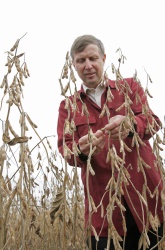
Jim Orf earned his MS and PhD from the University of Illinois. He is a Professor in the Department of Agronomy and Plant Genetics at the University of Minnesota where he oversees a soybean variety development program which includes food type soybeans. He conducts research on soybean genetics, soybean breeding methodology and soybean variety evaluations. He collaborates with other researchers (departmental, university, national and international) in both the private and public sectors, in conducting soybean research. Dr. Orf teaches a class entitled "Plant Genetics and Breeding," and assists in training graduate students working on soybean breeding projects as well as those focusing on a variety of other projects. Dr. Orf has published over 135 refereed journal articles and 290 proceedings and abstracts. He has released nearly 100 soybean varieties. He has received several awards which include Fellow of American Society of Agronomy, Crop Science Society of America, and American Association for the Advancement of Science. Dr. Orf has also served as a volunteer with the Peace Corps in Kenya.
Jim Orf earned his MS and PhD from the University of Illinois. He is a Professor in the Department of Agronomy and Plant Genetics at the University of Minnesota where he oversees a soybean variety development program which includes food type soybeans. He conducts research on soybean genetics, soybean breeding methodology and soybean variety evaluations. He collaborates with other researchers (departmental, university, national and international) in both the private and public sectors, in conducting soybean research. Dr. Orf teaches a class entitled "Plant Genetics and Breeding," and assists in training graduate students working on soybean breeding projects as well as those focusing on a variety of other projects. Dr. Orf has published over 135 refereed journal articles and 290 proceedings and abstracts. He has released nearly 100 soybean varieties. He has received several awards which include Fellow of American Society of Agronomy, Crop Science Society of America, and American Association for the Advancement of Science. Dr. Orf has also served as a volunteer with the Peace Corps in Kenya.
